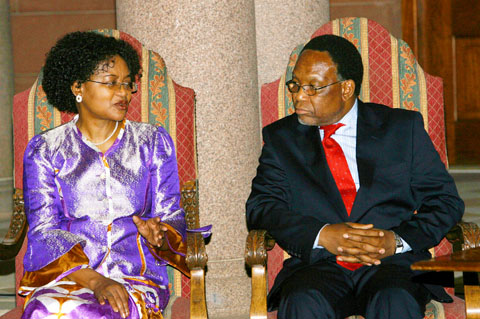Newly elected South African President Kgalema Motlanthe won praise on Friday for quickly forming a government after a week of political turbulence, but still faces fallout from the ouster of Thabo Mbeki.
Motlanthe unveiled his Cabinet shortly after his inauguration on Thursday, just days after the ruling African National Congress (ANC) forced former president Mbeki to resign in a bitter internal power struggle with party boss Jacob Zuma.
South Africa’s first democratic leader and anti-apartheid icon Nelson Mandela said on Friday Motlanthe was “eminently deserving” of the job and stressed the country was in “good hands” under him.

PHOTO: AFP
“You are a quiet, firm and principled leader, one who puts reason above emotions and one who seeks to unite rather than divide,” Mandela said in a letter.
Mandela also paid tribute to Mbeki, praising the achievements of his government as “impressive,” and wished his former deputy and successor well.
The new Cabinet members were sworn in on Friday in a reshuffle that won widespread praise in South African media — especially for Motlanthe’s decision to strip controversial health minister Manto Tshabalala-Msimang of her post.
Nicknamed “Dr Beetroot” for her advocacy of vegetables and garlic to fight AIDS, both she and Mbeki were derided for delaying programs to treat the disease, which has infected more than 5 million South Africans.
She remains in Cabinet as minister in the presidency, but the advocacy group Treatment Action Campaign hailed the change, saying: “The period of politically supported AIDS denialism has ended.”
The group also praised her successor Barbara Hogan as “hard-working, competent and principled.”
Hogan said after her swearing in that she felt energetic about the challenges facing her department.
“There will be big changes but no dramatic changes,” she said.
Motlanthe also kept the respected Finance Minister Trevor Manuel, in a move welcomed by business leaders after a week in which markets were badly spooked by the crisis within the ruling party.
The Chamber of Mines, representing one of South Africa’s most important industries, praised “the swift and decisive manner in which President Motlanthe ... brought calm to the markets after the uncertainty of the past week.”
Motlanthe took pains to emphasize in his inaugural speech to parliament that he would continue the government’s economic policies, which have brought sustained growth, while also tackling the twin problems of poverty and crime.
“Motlanthe restores order,” said the Star newspaper’s front page, echoing sentiments of relief in the local press, which generally hailed the new president for moving quickly to install his Cabinet.
Despite the praise, the new president is expected to spend just a few months in office as he guides the country toward elections next year.

‘HYANGDO’: A South Korean lawmaker said there was no credible evidence to support rumors that Kim Jong-un has a son with a disability or who is studying abroad South Korea’s spy agency yesterday said that North Korean leader Kim Jong-un’s daughter, Kim Ju-ae, who last week accompanied him on a high-profile visit to Beijing, is understood to be his recognized successor. The teenager drew global attention when she made her first official overseas trip with her father, as he met with Chinese President Xi Jinping (習近平) and Russian President Vladimir Putin. Analysts have long seen her as Kim’s likely successor, although some have suggested she has an older brother who is being secretly groomed as the next leader. The South Korean National Intelligence Service (NIS) “assesses that she [Kim Ju-ae]

In the week before his fatal shooting, right-wing US political activist Charlie Kirk cheered the boom of conservative young men in South Korea and warned about a “globalist menace” in Tokyo on his first speaking tour of Asia. Kirk, 31, who helped amplify US President Donald Trump’s agenda to young voters with often inflammatory rhetoric focused on issues such as gender and immigration, was shot in the neck on Wednesday at a speaking event at a Utah university. In Seoul on Friday last week, he spoke about how he “brought Trump to victory,” while addressing Build Up Korea 2025, a conservative conference

China has approved the creation of a national nature reserve at the disputed Scarborough Shoal (Huangyan Island, 黃岩島), claimed by Taiwan and the Philippines, the government said yesterday, as Beijing moves to reinforce its territorial claims in the contested region. A notice posted online by the Chinese State Council said that details about the area and size of the project would be released separately by the Chinese National Forestry and Grassland Administration. “The building of the Huangyan Island National Nature Reserve is an important guarantee for maintaining the diversity, stability and sustainability of the natural ecosystem of Huangyan Island,” the notice said. Scarborough

DEADLOCK: Putin has vowed to continue fighting unless Ukraine cedes more land, while talks have been paused with no immediate results expected, the Kremlin said Russia on Friday said that peace talks with Kyiv were on “pause” as Ukrainian President Volodymyr Zelenskiy warned that Russian President Vladimir Putin still wanted to capture the whole of Ukraine. Meanwhile, US President Donald Trump said that he was running out of patience with Putin, and the NATO alliance said it would bolster its eastern front after Russian drones were shot down in Polish airspace this week. The latest blow to faltering diplomacy came as Russia’s army staged major military drills with its key ally Belarus. Despite Trump forcing the warring sides to hold direct talks and hosting Putin in Alaska, there